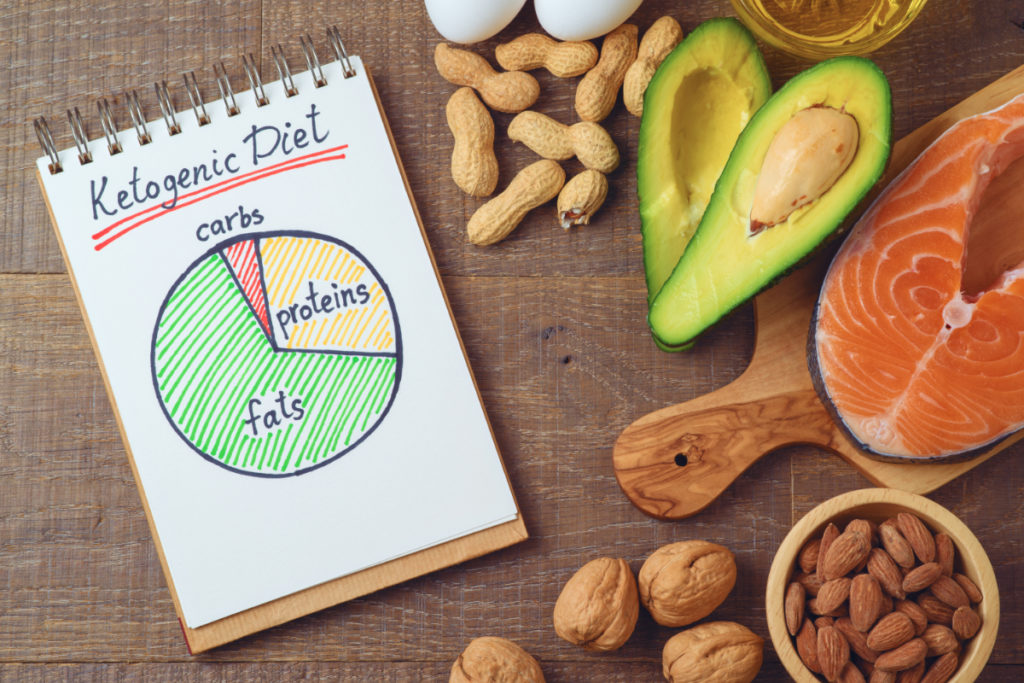“Hey everybody! For today’s video, I had to have a seat because I’m going to talk about a very controversial topic – nutrition. I’m going to talk specifically about the differences between a low carb or ketogenic diet or a low fat diet. All right. So let’s get into it first and foremost, I’m making this video because a lot of times people first come to me, I’ll sit down with them for nutrition consultation and they’ll say, “Sam, what should I do? Should I be on a keto like my aunt Beth, or I don’t know, she’s lost a lot of weight, but I’ve also heard on the news that a low fat diet is the way to go, which is… what do I need to start doing?” So we’re going to address both kind of what the keto diet is and what a low fat diet is.

So ketogenic diet first and foremost is 75% of that is coming your caloric needs or coming from fat. 20% of your caloric needs are coming from protein and the fiber or less are coming from carbohydrates. The reason that I tell you those statistics is most people will mess that up and they’re just kind of keto-ish, which isn’t a real thing. It’s just, then you’re just kind of eating more fat than you normally would. So that is the ketogenic diet, kind of the way it’s broken down.
Some pros from the ketogenic diet are it does have a good impact on your insulin. There’s a lot of recent research that suggests it has good benefits for insulin sensitivity. Also people when they get into ketosis, which is a very small percentage by the way that people that actually embark on the ketogenic diet ever feel ketosis but when they do that has good mental benefits.
Some cons… performance, a lot of people notice that their performance will dip when they’re on a ketogenic diet. That’s because of the lack of carbohydrates, that they’re accustomed to feeling their workouts. Also, the sustainability is also a huge factor. A lot of people I have met, a whole lot of people that have done the ketogenic diet six to eight years. A lot of them met a lot of people that have tried it out for a month or two, but no one really sustaining long-term. It is also important to note that I have done both of these diets personally, I have personal experience with them. Yeah, the sustainability of the ketogenic diet is just not something long-term, taking in that much fat. And then over time, people will really rev up the fat, which has more calories per gram, than carbohydrates. So people can overeat on the ketogenic diet as well. A lot of times this diet is popular because people will lose weight right away from flushing out all the carbohydrates. If you think about carbo – hydrate, what they do is they hydrate you. So a lot of the weight is water weight initially, just to be aware of that. And the reason that both these diets do work is because they were strict a certain macronutrient. So in this case would be carbohydrates on the ketogenic diet, the low fat diets obviously fat. When you restrict one of those, you’re going to have less calories overall, thus, a negative energy balance, and you’re going to lose weight. That’s kind of the trick behind it. So not I went off on that tangent, let’s talk about the low fat diet.

A low fat diet… You’re going to have very little fat 20% or less on a low fat diet. I believe this became popular because a lot of people in the 80s, early 90s were saying, you know dietary fat is directly related to heart disease, things like that, a lot of research since then showing that there is no correlation there, just to be clear on that. So low fat diet… What I’ll notice with clients is sometimes especially female clients have to be careful because a lot of hormones are produced, and transported through the things we get in our dietary fats. So you’re not going to be as easily absorbing specific nutrients, such as fat-soluble vitamins like A, D, K, and E. So you have to be very careful about micronutrient deficiencies when you’re out on a low fat diet.

So here’s my 2 cents on it all just to kind of wrap it up… a balanced approach is the way to go. I would throw either one of these diets out. They’re not sustainable. I haven’t seen people last very long on either one of them I’m talking to, you know, a decade plus, and that’s what we’re looking for. Sustainability long-term health, a good way to kind of approach a sustainable diet would be to organize it around these, take kind of the ideas from the ketogenic diet and the low fat diet and organize it around that. So a way to do that would be… okay. I’m not going to have fats and carbs in the same meal. So for example, you can for breakfast, have a protein, a vegetable, and a carbohydrate. For lunch, you could have the same thing. And then for dinner, just take out that carbohydrate and swap it with a fat. So then you’re going to have protein, vegetables, and fat for dinner. That’s going to keep you well balanced and that’s kind of where we start most of the clients that I work with.
So I hope you found this video valuable. If you liked it, give me a thumbs up, give me a heart. If you didn’t write in the comments, you suck whatever. Or if you have any questions, leave them in the comments. I look forward to responding to all you guys’ messages. Again, I hope you found this valuable. That’s all for today and as always stay strong.”



